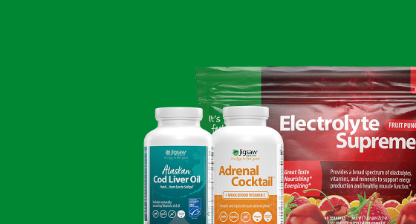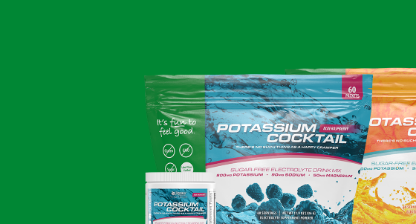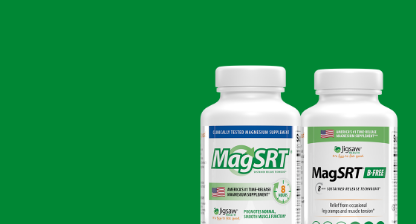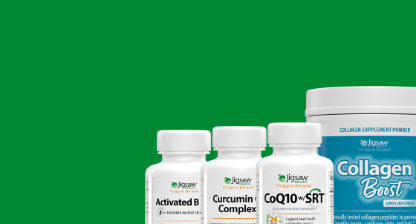Thomas DeLauer (aka "Mr. Mineral") explains what the body's electrical system is and how different elements work in the body on the latest #ScienceSaturday
Sick of Sugary fruit drinks? Replenish your Electrolytes with Jigsaw Electrolyte Supreme™ today!
Electrolyte Supreme™ Berry-Licious is available in Jars and Packets
Want to relax Tense Muscles? Order Jigsaw Health's Magnesium w/SRT today!
MAG w/SRT® now available for purchase HERE
Captions by trint.com
Your body is a lot more like a car. More like a house than you think.
See we have different electrical systems that run through our bodies that really dictate how our bodies actually work. What's going on Jigsaw nation it's Thomas DeLauer, I'm going to break down, since so many people have asked how the electrical system in your body truly works and what an electrolyte really is and why it's a lot more important than a lot of people give it credit for. It's not all about just grabbing the Powerade off the shelf. It's more about really truly understanding the electrical system and the power outlets inside your body and inside your organs. See, essentially all the electrolyte is is either negatively charged or positively charged ion within the body. And it becomes a negative or positive charge ion once it's combined with bodily fluids. Quick example something like sodium magnesium potassium. When it's in its dry form it doesn't really do much but once it's combined in your body with the fluids it becomes either negatively charged or positively charged. I gonna explain in very exquisite detail in basic terms throughout this entire video how this works so stick with me. The essential role of an electrolyte within the body is to actually maintain fluid balance. Most people think that it's only to send an electrical charge from point A to Point B but that's actually not the truth. You see, the main role is to fluctuate water in and out of the cell. That fluctuation of water in and out of the cell is what allows the electrical charge to take place at either a fast rate or a slow rate or at a dramatic rate or in a less dramatic rate.
So that fluid balance is what's most important. You think about the constant battle between positively charged and negatively charged. You can see how that transfer of energy between the two literally creates electricity within the body. This electricity is what's responsible for you being able to contract muscles, for you being able to move your lips and talk, for your heart to be able to beat, for your lungs to be able to involuntarily just breathe in and out. So many functions if not every function of the body is dependent on electrolytes. That's why so many marketers have been able to make such a big claim such a big to do about picking up Gatorade or picking up Powerade. Because they know they can lean on the importance of it. But if you understand how it works you may not always need to grab that sports drink that's loaded with sugar. So a cell can adjust its fluid levels simply by how much in the way of electrolytes we're taking in. For example if we're taking in more sodium more potassium more electrolytes, we're going to have an influx of water coming into the cells drawing water in. But if we have a decrease in electrolytes we have an efflux of water coming out of the cell. And this all starts to make sense when you think about muscle contractions and you think about muscle cramping. Have you ever worked out really, really hard and then found a couple hours later that you start to cramp up?
Well it's because you may have a decrease in certain electrolytes that's causing the water to leave the cell throwing things out of balance so that the cell is no longer able to signal the right kind of contraction. It's not able to receive the message from the electrical system to release the muscle. That is a perfect example of how an efflux of water out of a cell can be very, very apparent. When you look at it a little bit deeper you realize that even the heart has these things as well. So if you end up having an efflux or an influx of water into the cells within the cell you can see how that can throw off the voltage for the entire body. These electrolyte balance that voltage system because the heart needs to be able to tell the rest of the body how hard it's working. So it can increased electricity or decreased electricity. If the heart is working faster and needs to be a stronger signal for the lungs, needs to be a stronger signal to the muscles. Everything needs to communicate. It's not all about coming from point A in the brain to point B in the muscle. There's an electrical system that we have to think about just like an internal combustion engine in the spark plugs keeping the fuel burning. You look an old muscle car you look at how it works. You've got the electrical system, you've got the wires. They're getting a signal they're running throughout the entire car. But then where is that signal coming from? What's dictating that? Well you have a distributor in that distributor is dictating where the power goes to actually create the spark to create the energy. And it goes through an alternator that alternator dictates where the energy goes to the rest of the car goes to the battery it goes to the tail lights, it goes to all kinds of things.
Well guess what it works the same way in your body except the distributor the spark plug the actual battery and the alternator. Those are all hormones. You see hormones are still at the critical point of all of this system, and it starts with the kidneys. The kidneys understand if you have too much sodium too much potassium or too little sodium or too little potassium and they have a hormone known as renen and this hormone that's known as renen sends signals to other areas of the body. For example it sends a signal to the adrenals, and the adrenals have a hormone known as aldosterone that helps regulate fluid retention. If you ever eat a high salt meal and you notice that you get puffy, well the adrenals the all the stairs are responsible for that. Then inside our heart and inside our lungs inside our brain we have something known as angiotensin. Angiotensin is a hormone that dictates what the electricity does within those organs. Then we have anti-diaretic and even diarretic hormones that are signaled by the pituitary. The pituitary is sort of the control center that says alright, we have too much water or too little water. We need to either excrete some or we need to hold on to some. And then they all communicate between the two making a finely tuned machine. Just like the car that you're driving down the road. Now quickly I want to break down some of the key electrolytes just some of it makes sense. First off we have calcium, ok it's the most abundant electrolyte within the body.
It's involved in a lot of contract tissue it's involved in a lot of strength it's involved in a lot of blood clotting and a lot of things that require a quick bout of tension. Then next we have sodium. Sodium is the most abundant cation which is a positive charge ion outside the cell. What this is responsible for is really truly nerve signaling. OK sending the signal actually transducting the energy from where it begins to where it ends. And then we have potassium. Potassium is the most abundant positively charged ion inside the cell. So you can see how sodium and potassium communicate. They're both positively charged and when they repel each other water leaves when they attract each other, water comes in. Then we look at phosphate. Phosphate makes up about 1 percent of your entire body weight. And what one of its main responsibilities is, is actually digestive, and actually working with digestion system to break down proteins fats in carbs that also allow proteins to synthesize what they need to synthesize to make your body renew and go through that rejuvenation process. Then we go down the line and we look at chloride. Chloride is the most abundant negatively charged ion outside the cell. And what this does is again regulates water but also regulates that acid base. If you've ever monitored your pH levels or anything like that, well chloride is a big contributor to that. It's going to regulate where your pH sits, where your acid levels sit within the body. Lastly I want to look at magnesium. Magnesium is the fourth most abundant mineral in the body, but starting to prove to be the most important. Magnesium is sort of the mediator.
I want you to think all these electrolytes and then think of magnesium as the cool guy that just says "Hey everyone, we need to have a good time we need to chill out". It's going to allow the muscle to relax. See while calcium is saying muscle tighten up, magnesium is saying muscle just relax. So that concentric versus excentric contraction magnesium is huge with that. Now apply that to your brain. It also tells your brain to relax. It does a lot of things but it's also involved in blood sugar regulation and blood pressure regulation. So do not let your magnesium levels go unnoticed. So what can you do about all this. I've given you all this information but now you're just educated, you don't know how to really apply any of it. Well, one of the most important things that you can do if you're living in the U.S. is stay hydrated, because one of the biggest issues with electrolyte imbalance in the United States is something known as hypernatrimia. That is simply when we have too much salt and not enough water. And the same thing can apply simply by not drinking enough water. Even if you don't consume much salt. So it's all a ratio.
In most other parts of the world the big issue is hyponatremia when they're not getting enough sodium so they're not able to send that electrical signal the way they should. So next time you're working out or when you're getting outside the summer and you're starting to sweat stop thinking about how you're just going to replenish yourself in a sports drink. Start thinking about what's really happening in your body and how you can really fine tune your body to get the best electrical charge, give you the best brain performance, the best muscle performance, and the best overall life performance. So make sure you click on a link and check out Jigsaw Health so that you can start taking advantage of the magnesium that you need to make your life the best. I will see you next Science Saturday Video.





















